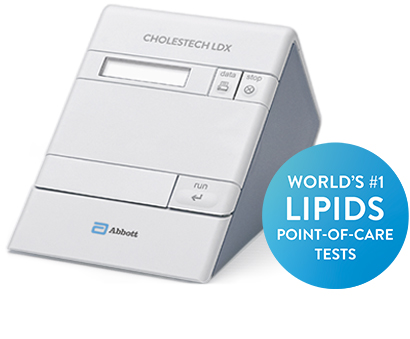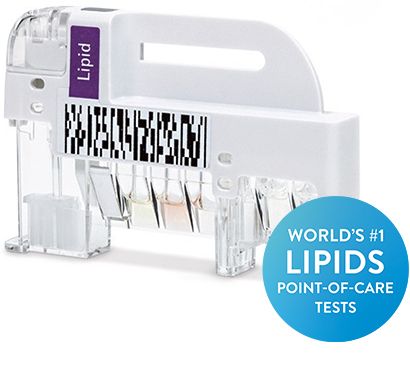Global Point of Care


Change the Odds of Cardiovascular Disease with Rapid Test Results
Rapid CVD Testing Can Change the Course of Patient Management
Cardiovascular Disease (CVD) is already the leading cause of death in the world.1 People with diabetes are 2-3 times more likely to develop CVD.2 But, CVD can often be prevented before it takes hold.
According to the World Health Organization (WHO), 80% of premature deaths from heart attack and stroke could be avoided by quitting smoking, becoming more physically active, and adopting a healthy diet.3 Early assessment, efficient diagnosis, and ongoing monitoring are all vital to achieving positive outcomes.
The problem is, that before healthcare providers can recommend those critical changes to their patients, they first have to be in a position to diagnose and monitor cardiovascular disease. Testing, treatment, and compliance are the key to everything.
Cardiovascular Disease Risk Factors to Know by Heart
The more risk factors your patients have, the greater their chances of getting cardiovascular disease. Even with few or no underlying issues, there is still a 30% chance of getting CVD.4,5 Risk factors for cardiovascular disease include:
- Hypertension
- High cholesterol
- Diabetes
- Chronic Kidney Disease
- Smoking
- Physical inactivity
- Unhealthy diet
- Excessive alcohol use
- High body mass index
- Family history
- Ethnic background

Most cardiovascular diseases can be prevented by addressing behavioral risk factors.
THE GLOBAL IMPACT OF CARDIOVASCULAR DISEASE



THE GLOBAL IMPACT OF CARDIOVASCULAR DISEASE
17.9 M
AN ESTIMATED 17.9 MILLION PEOPLE DIED
FROM CARDIOVASCULAR DISEASE IN 2019, REPRESENTING 32% OF ALL GLOBAL DEATHS.1
85%
85% OF ALL CVD DEATHS ARE DUE TO
HEART ATTACK AND STROKE.1
271 M TO 523 M
BETWEEN 1990 AND 2019, CVD CASES NEARLY DOUBLED FROM 271 MILLION TO 523 MILLION.6
50%
THE LIFETIME RISK OF CVD IS MORE THAN
50% FOR BOTH MEN AND WOMEN.4,5


Learn how rapid diagnostic solutions can help
In 2015, the total global cost of cardiovascular disease was approximately $957 billion. By 2030, it’s expected to rise to $1,044 billion.11,12
Reducing the burden on both patients and the global health system hinges on cardiovascular disease management interventions—and that starts with testing and monitoring. Lab testing is accurate and reliable, but it presents challenges. You might ask your patients to go to a lab collection site to take a panel of tests. That doesn’t mean they’ll go.
Even if you can draw the lab samples at your office, it often takes days before the results come back. And when the numbers finally arrive, you need to follow up with the patient which takes time your team doesn’t have.
Rapid diagnostics, on the other hand, offer lab-quality results without the wait. With point of care testing (POCT), you can collect the samples and receive the results within a matter of minutes. If the levels are out of range, you can take action before the appointment ends, whether that’s educating the patient about lifestyle changes or prescribing medication. No time is lost. No urgency is lost. And your patient has everything to gain.
available products
Abbott makes a wide range of rapid diagnostic solutions with one thing in common: giving you the confidence you need in the moment to instill a lifetime of positive change in your patients.
CHOLESTECH LDX™ ANALYZER
The Cholestech LDX™ Analyzer empowers healthcare professionals and patients with a lab-accurate complete lipid profile and glucose in 5 minutes per test cassette.
Afinion™ Lipid Panel
The Afinion™ Lipid Panel test and the fully automated Afinion™ Analyzer, give you reliable results conveniently available when and where you need them. Patient consultations can be carried out with confidence.
References
- World Health Organization. Cardiovascular diseases (CVDs). June 2021; accessed 3. April 2024: https://www.who.int/news-room/fact-sheets/detail/cardiovascular-diseases-(cvds)
- International Diabetes Federation. IDF Diabetes Atlas, 8th edn. 2017
- American College of Cardiology. Heart Attack Deaths Drop Over Past Two Decades. Feb 2023; accessed 3. April 2024: https://www.acc.org/About-ACC/Press-Releases/2023/02/22/21/30/Heart-Attack-Deaths-Drop-Over-Past-Two-Decades
- MedicalNewsToday. What to know about cardiovascular disease. Updated Nov. 29 2023; https://www.medicalnewstoday.com/articles/257484
- Wilkins JT, Ning H, Berry J et al. Lifetime Risk and Years Lived Free of Total Cardiovascular Disease. Jama 2012; 308(17):1795-1801
- Roth GA, Mensah GA, Johnson CO et al. Global Burden of Cardiovascular Diseases and Risk Factors, 1990–2019: Update From the GBD 2019 Study. JACC 2020;76(25); https://www.jacc.org/doi/epdf/10.1016/j.jacc.2020.11.010
- McGowan MP, Dehkordi SHH, Moriarty PM, Duell PB. Diagnosis and Treatment of Heterozygous Familial Hypercholesterolemia. J Am Heart Assoc. 2019;8:e013225. https://doi.org/10.1161/JAHA.119.013225
- 2019 ESC/EAS Guidelines for the management of dyslipidaemias. European Heart Journal 2019
- Centers for Disease Control and Prevention (CDC). Familial Hypercholesterolemia; accessed 4. April 2024: https://www.cdc.gov/genomics/disease/fh/FH.htm
- Norhayati MN, Masseni AA, Azlina I. Patient satisfaction with doctor-patient interaction and its association with modifiable cardiovascular risk factors among moderately-high risk patients in primary healthcare. PeerJ 2017;5:e2983; https://doi.org/10.7717/peerj.2983
- World Heart Federation. Why Circulatory Diseases Matter. Accessed 4. April 2024: https://world-heart-federation.org/wp-content/uploads/2021/04/Infographic-Why-Circulatory-Health-Matters.pdf
- Chen Z, Lee M, Redfern J et al. The Cost-Effectiveness of Digital Health Interventions on the Management of Cardiovascular Diseases_Systematic Review. J Med Internet Res 2019 Jun; 21(6): e13166; 10.2196/13166: https://doi.org/10.2196/13166














